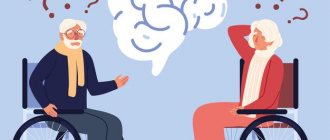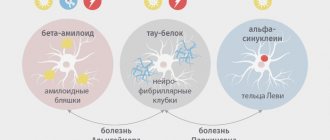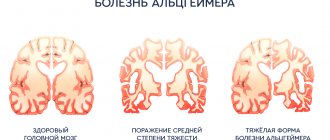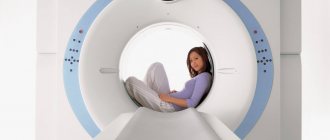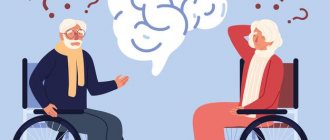Alzheimer's disease
is a chronic, progressive disease that impairs memory, thinking and movement. Some studies show that a person is at increased risk of developing Alzheimer's disease if they have a relative with the disorder.
Alzheimer's disease
is the most common cause of dementia and can seriously affect a person's ability to think, make judgments and carry out everyday tasks. Doctors have known about Alzheimer's disease for years, but many aspects of the condition and possible treatments remain unknown. The causes of Alzheimer's disease are unclear. Modern research shows that many factors can contribute to the development of Alzheimer's disease, one of which is genetics or heredity.
Is Alzheimer's disease inherited?
Scientists describe genetic risks for Alzheimer's disease in terms of two factors: risk genes and determinant genes.
When a person has risk genes, it means they are more likely to develop the disease. For example, a woman with the BRCA1 and BRCA2 genes has a higher risk of developing breast cancer.
Determined genes can directly cause the development of the disease.
Scientists have discovered several risk and deterministic genes for Alzheimer's disease.
Course of Alzheimer's disease: predementia
The first signs of Alzheimer's disease, which, as mentioned above, are expressed in problems with memory, attention and remembering new information, can take up to 10 years to appear. In medicine they are defined as a state of pre-dementia
This stage of the disease is insidious in that it rarely alarms the sick person’s loved ones. They usually attribute his condition to age, fatigue, workload, etc.
In medicine they are defined as a state of pre-dementia. This stage of the disease is insidious in that it rarely alarms the sick person’s loved ones. They usually attribute his condition to age, fatigue, workload, etc.
Therefore, at this stage of the disease, it is extremely rare to turn to doctors for help, although you should be wary if a loved one is increasingly showing the symptoms described below.
- The patient has problems finding words during a conversation and has difficulty understanding abstract thoughts.
- It is increasingly difficult for such a person to make independent decisions, he is easily lost in a new environment, he loses initiative and the desire to act, and instead appears indifference and apathy.
- The patient has difficulty performing household chores that require mental or physical effort, and gradually loses interest in previously favorite activities.
Risk genes
Several genes pose a risk for developing Alzheimer's disease. The gene with the most significant association with Alzheimer's disease is the apolipoprotein E-e4 (APOE-e4) gene. About 20-25% of people with this gene may suffer from Alzheimer's disease. A person who inherited the APOE-e4 gene from both parents has a higher risk of developing Alzheimer's disease than a person who inherited the gene from only one. Having the gene may mean that a person exhibits symptoms at an earlier age and is diagnosed earlier. Other genes may influence late-stage Alzheimer's disease and its progression. Scientists need to do more research to find out how these genes increase the risk of developing Alzheimer's disease.
Some of these genes regulate certain factors in the brain, such as inflammation and the way nerve cells communicate. While everyone inherits the APOE gene in some form, the APOE-e3 and APOE-e2 genes have no connection with Alzheimer's disease. APOE-e2 may even have a protective effect on the brain against the disease.
Genes affecting the condition and functioning of the brain
The genetic factor underlies many pathologies that are inherited, and dementia is no exception. One of the scientific hypotheses about the possible nature of its origin allows us to make an assumption whether Alzheimer's disease is hereditary. Today, the amyloid theory is fundamental. According to studies, it was possible to establish that the death of nerve cells occurs due to excessive accumulation of dense beta-amyloid plaques in them. The APP gene, which is inherited and located on chromosome 21, is directly involved in the formation of insoluble protein deposits. A mutation of this gene leads to increased production of senile plaques in brain tissue, which interfere with the normal transmission of nerve impulses.
The presence of the APP and APOE4 gene isoforms on chromosome 19 does not mean that Alzheimer's disease will necessarily be inherited from parents to children. Such genetic mutations in the body increase the risk of developing the disease in complex combination with other possible provocateurs of irreversible degenerative changes in the brain. The most common ones include:
- old age after 65 years;
- traumatic brain injuries of the head;
- chronic diseases of the cardiovascular system;
- hormonal imbalances;
- low level of education, low-intellectual occupations;
- prolonged exposure to toxic substances, radiation, electromagnetic radiation;
- alcohol abuse, smoking.
An inherited predisposition to Alzheimer's disease is also observed in people with mutations in the genes of chromosomes 1 and 14, but scientists still find it difficult to name a cause-and-effect relationship between these facts. At present, only the fact has been established that Alzheimer's disease and heredity can be traced in 10% of all registered clinical cases of the disease.
Determined genes
Researchers have identified three specific deterministic genes that may cause Alzheimer's disease:
- amyloid beta precursor (APP)
- presenilin-1 (PS-1)
- presenilin-2 (PS-2)
These genes are responsible for excessive accumulation of amyloid beta peptide, a toxic protein that accumulates in the brain and causes nerve cell damage that is characteristic of Alzheimer's disease. However, not all people with early-onset Alzheimer's disease have these genes. A person with these genes who develops Alzheimer's disease has a rare type known as familial Alzheimer's disorder. Familial Alzheimer's disease accounts for less than 5% of all cases worldwide. Alzheimer's disease, caused by genetic determinants, usually occurs before age 65. Sometimes it can develop in people aged 40-50 years.
Alzheimer's in people with Down syndrome
The inheritance of senile dementia is confirmed by such congenital genomic pathology as Down syndrome. Normally, each person inherits a set of 46 chromosomes from their parents, 23 from the father and 23 from the mother. When the 21st chromosome inherits a third copy instead of one pair, this neurodegenerative syndrome is diagnosed. The assertion that Alzheimer's disease is a hereditary pathology is based on the fact that it is mutations in chromosome 21 that trigger the process of active production of abnormal amyloid plaques in brain cells. Thus, the additional chromosome inherited becomes another source of a protein substance that steadily destroys healthy neurons.
Most people with Down syndrome experience dementia before the age of 40, with an average life expectancy of 50 years. The hereditary predisposition to Alzheimer's disease in individuals with such chromosomal abnormalities provides direct support for the amyloid hypothesis.
Gene influence on other types of dementia
Some types of dementia are associated with other genetic defects.
Huntington's disease
, for example, is caused by a change in chromosome 4, which can manifest as progressive dementia. Huntington's disease is a dominant genetic disorder. This means that if one parent has the disease, they can pass the gene on to their offspring and they will develop the disease. Symptoms of Huntington's disease usually do not appear until age 30 to 50. This can make it difficult for doctors to predict and diagnose before a person has children and passes on the gene.
Researchers believe that Lewy body dementia, or Parkinson's disease dementia, may also have a genetic component. However, they believe that other factors not related to genetics may also play a role in the development of these conditions.
Symptoms
Alzheimer's disease is characterized by an insidious onset, slow development at the initial stage, constant progression without periods of remission, accelerated development in the middle and final stages, and death.
As a rule, death occurs 7 years after diagnosis, and the diagnosis itself is established on average 7 years after the onset of the disease.
There are four main stages in the development of Alzheimer's disease.
Initial stage (pre-dementia)
A characteristic symptom of the initial stage of the disease is impaired short-term memory. A person has problems remembering new information. He forgets the events that happened the day before, recently, yesterday. But at the same time he remembers well old events, skills acquired many years ago.
Impaired mental performance is manifested by the inability to plan, the inability to concentrate, forgetting the meaning of some words and, after futile attempts to remember, replacing them with other words.
This period can last 7–8 years without causing much concern.
Early dementia
At this stage, the ability to perceive new information is lost, memory for recent events is lost, visual, auditory, tactile perception, and fine motor skills are impaired. Ordinary activities at work and at home cause difficulties.
Long-standing skills (professional, everyday) and memory for distant events are still preserved, but the person seems to fall out of time. He does not understand well what is happening around him, what he is doing and does not remember anything.
Moderate dementia
Symptoms of severe Alzheimer's disease are speech impairment (incoherence), loss of reading and writing skills. Instead of forgotten words, a person increasingly uses others, most often inappropriate ones, because of this his speech becomes more and more meaningless.
Fine motor skills are so impaired that a person loses the ability to perform the most ordinary actions, serve himself in everyday life and needs outside help to fasten buttons and bring a spoon to his mouth.
One of the characteristic somatic symptoms at this stage is urinary incontinence.
Over time, a person ceases to understand who surrounds him and where he is, and does not recognize close relatives. His psycho-emotional state is constantly changing, from tearfulness to aggressiveness.
At this stage, patients develop wandering syndrome. A man leaves home and cannot find his way back.
Severe dementia
At this stage, a person needs constant monitoring and medical care. He completely loses the ability to care for himself. Contact with others is lost, he does not recognize anyone and does not react to anything. Symptoms of physical and mental exhaustion develop. Over time, the person stops getting out of bed.
In the absence of medical care and palliative care, secondary complications develop - congestive pneumonia, bedsores, etc., which lead to death.
Thus, people with Alzheimer's disease suffer from:
- memory (first short-term, and then medium- and long-term),
- thinking,
- psycho-emotional state,
- orientation in space,
- writing, reading skills,
- fine motor skills.
At a late stage of the disease, muscle cramps, seizures, delirium, and hallucinations are possible.
Risk factors for developing Alzheimer's disease
Researchers have identified several risk factors for developing Alzheimer's disease. These include:
Age
: The most significant risk factor for developing Alzheimer's disease is age. People over 65 are more likely to develop Alzheimer's disease than younger people. By age 85, 1 in 3 people have this condition.
Family history
: Having a close relative with Alzheimer's disease increases your risk of developing it.
Head injury
: People with a history of severe head trauma, such as from a car accident or contact sports, are at higher risk of developing Alzheimer's disease.
Heart Health
: Cardiovascular health problems may increase your chance of developing Alzheimer's disease. Examples include high blood pressure, ischemic stroke, diabetes, heart disease and high cholesterol. The conditions listed above can damage blood vessels in the brain, which affects the risk of developing Alzheimer's disease.
Alzheimer's disease: causes, diagnosis, treatment
Alzheimer's disease is a form of dementia or dementia that cannot be reversed. The disease is accompanied by progressive memory loss, decreased intellectual abilities, and deterioration of language and speech skills. All these symptoms together lead to a change in a person’s behavior and a decrease in the quality of his life, resulting in complete social maladjustment. In Alzheimer's disease, damage to brain tissue is primary. The pathological process is associated with the accumulation of amyloid protein in the interstitial substance of the brain and the formation of senile plaques, tau protein in the cells of the nervous tissue and the formation of typical structures called neurofibrillary tangles. The formation of pathological structures leads to damage and death of nerve cells, a decrease in the level of neurotransmitters, and a deterioration in interaction between parts of the brain.
Alzheimer's disease begins with minor memory problems as the temporal lobes of the cerebral cortex are the first to be affected. A person forgets where he put the thing, what this cutlery is for, what he went to the store for, what time he should come to work, etc. A person may not remember his date of birth, his residential address, the names of his own children, and may get lost in simple questions, for example, what day is it today, what time is it, where and who does he work for. Later, speech disturbances appear, the patient cannot remember the right word, orientation disorders are observed, and the person cannot find his way home.
Stages of the disease
There are three stages in the course of Alzheimer's disease. At the first stage, the patient can take care of himself independently; at the second stage, he cannot do without the help of loved ones. A person cannot dress himself, take a shower, wash dishes, etc. During the third stage, dependence on the presence of a loved one becomes total: the patient cannot perform a single daily activity without outside help.
Disease and age
The risk of Alzheimer's disease and other forms of dementia increases significantly with age. Isolated cases of the disease are observed after 40 years of age; in people over 65 years of age, the disease is detected in 10–12% of cases; in people over 85 years of age, in 30–40% of cases.
There are early and late onset Alzheimer's disease. Early onset manifests itself before the age of 65 and is characterized by rapid progression. A number of assumptions have been made about the genetic component of the disease. “Late onset” Alzheimer's disease appears after 65 years of age, is not considered inherited, and its course is smoother.
Genetic predisposition
Alzheimer's disease is caused by many factors that are not yet well understood. Three genes have been identified whose mutations are associated with rare early familial forms of the disease. They account for 5% of all cases. The PSEN1, PSEN2 and AP genes, located on chromosomes 14, 1 and 21, are responsible for the synthesis of abnormal protein structures, which are the pathomorphological substrate of Alzheimer's disease. There is a 50% chance that the gene mutation will be passed on to each of the children of a carrier of the pathological gene.
Other genes have been linked to late-onset Alzheimer's disease. They are not considered to be the direct cause of the disease process, although they may explain why there is an increased risk of developing late onset in individuals with a family history of the disease. The APOE gene is one of them. The APOE gene is responsible for the production of apolipoprotein E, a protein that transports lipids (fats and cholesterol) in the blood. The APOE gene exists in three different forms (alleles): E2, E3 and E4. Each person inherits two APOE alleles, which are a combination of these three. E3 is the most common allele in the population, found in 60% of the general population. The presence of the E4 APOE allele is associated with the majority of familial cases and an increased risk of developing Alzheimer's disease, and is therefore considered a prognostically unfavorable combination.
Risk factors
Along with genetic factors, there are other risk factors for Alzheimer's disease. These include type 2 diabetes and milder forms of insulin resistance, obesity, high blood pressure, dyslipidemia, and high levels of inflammatory markers such as C-reactive protein (CRP).
Diagnostics
An accurate clinical diagnosis of Alzheimer's disease is made based on the clinical picture, using various tests and procedures to rule out other causes of dementia. The doctor evaluates the person's personal and family medical history and administers neuropsychological tests to measure memory, language skills and other cognitive functions.
Imaging tools such as computed tomography (CT) and magnetic resonance imaging (MRI) are often used to look for signs of injury, tumors and stroke, as well as atrophic changes in the brain seen as the disease progresses.
Unfortunately, there are no laboratory tests to diagnose Alzheimer's disease during life. The only accurate tool to confirm the presence of the disease is a histological examination of a section of the brain after death. Pathologists describe senile plaques and neurofibrillary tangles characteristic of Alzheimer's disease. Since the formation of plaques and tangles is also observed during normal aging, the sample is compared with a control sample of normal brain tissue from a person of the same age who does not have the disease.
In 2011, new criteria and recommendations for diagnosing Alzheimer's disease were developed. Preclinical, subclinical and clinical stages of the disease have been identified, and new criteria for dementia syndrome in Alzheimer's disease have been developed.
The preclinical stage of Alzheimer's disease is characterized by the absence of cognitive impairment, but amyloid bodies can be detected in the brain. The appearance of biomarkers in neuroimaging is a harbinger of dementia 10–15 years before its manifestation. This stage is highlighted to help guide research towards early diagnosis of the condition.
Mild cognitive impairment due to Alzheimer's disease is the presence of mild changes in memory and thinking ability that do not interfere with daily activities.
Dementia due to Alzheimer's disease. Memory, thinking, and behavioral symptoms that interfere with a person's ability to function in daily life.
The recommendations are intended to provide more information about the current understanding of Alzheimer's disease and provide a basis for future research.
Treatment
Drug therapy includes a group of cholinesterase inhibitors and antiglutamatergic drugs. Non-drug therapy is aimed at improving cognitive functions and the formation of neural connections: aerobic physical activity, maintaining an active social life, and performing cognitive training.
Early signs of Alzheimer's disease
Alzheimer's disease is usually accompanied by a gradual loss of memory and brain function. Early symptoms may include periods of forgetfulness or memory loss. Over time, a person may experience confusion or disorientation in familiar environments, including at home.
Other symptoms may include:
- changes in mood or personality
- confusion about time and place
- difficulty with routine tasks such as doing laundry or cooking
- difficulty recognizing objects
- difficulty recognizing people
The aging process can naturally deteriorate a person's memory, but Alzheimer's disease leads to longer periods of forgetfulness.
Over time, a person with Alzheimer's disease may need more and more assistance with activities of daily living, such as brushing teeth, getting dressed, and eating. They may experience agitation, restlessness, personality disorders and speech problems. The life expectancy of a person with Alzheimer's disease is usually 8 to 10 years after the first symptoms of the disease appear.
Because people with advanced Alzheimer's disease are unable to care for themselves or may not understand the importance of food, common causes of death include malnutrition, malnutrition, or pneumonia.
Symptoms of Alzheimer's Disease (Part 4 Is Alzheimer's Disease Genetic?)
Alzheimer's disease is a progressive disease, and people often go through various stages of memory and cognitive loss. Depending on the stage of Alzheimer's disease, people with Alzheimer's disease may experience the following symptoms, based on information from the National Institute on Aging.
Some aging people may experience mild cognitive impairment (MCI). MCI is not Alzheimer's disease, but may increase a person's chances of developing Alzheimer's disease in the future.
Early stage Alzheimer's disease (mild)
At this stage, a person with Alzheimer's disease can function independently. They may have memory problems, such as arranging objects incorrectly or forgetting familiar words. Although the symptoms may not be very obvious, they may be noticed by close family and friends.
- Memory loss
- Poor judgment leading to poor decisions
- Loss of spontaneity and sense of initiative
- Takes more time to complete normal daily tasks
- Recurring questions
- Problems with money and paying bills
- Wandering and getting lost
- Losing things or losing them in strange places;
- Changes in mood and personality
- Increased anxiety and/or aggression
Mid-stage Alzheimer's disease (moderate)
This stage can last for many years. Symptoms of dementia are more severe and the person may feel confused, upset or angry.
- Increased memory loss and confusion
- Inability to learn new things
- Difficulty with language and problems with reading, writing and working with numbers
- Difficulty organizing thoughts and thinking logically
- Reduced attention span
- Problems with new situations
- Difficulty performing multi-step tasks, such as getting dressed
- Trouble recognizing family and friends
- Hallucinations, delusions and paranoia
- Impulsive behavior such as taking off your clothes at the wrong time or place or using vulgar language
- Inappropriate outbursts of anger
- Restlessness, agitation, restlessness, tearfulness, wandering - especially late in the day or evening
- Repetitive statements or movements, random muscle twitches
Late stage Alzheimer's disease (severe)
People lose the ability to respond to their environment, carry out a conversation, and ultimately control their movements. Communication is usually difficult.
- Inability to communicate
- Weight loss
- Convulsions
- Skin infections
- Difficulty swallowing
- Moaning, groaning or grunting
- Increased sleep
- Loss of bowel and bladder control
When to see a doctor
Seeking medical help for a person who has these symptoms is vital. Your doctor can rule out other conditions that may cause dementia, such as a urinary tract infection or a brain tumor.
Family members should make a list of all medications the symptomatic person is currently taking. Your doctor can review the list to make sure your dementia symptoms are not side effects of medications.
Identifying noticeable symptoms and their progression can help the doctor identify potential patterns. Although genetic testing is available, doctors generally do not recommend it. Having the genes does not necessarily mean a person will have the condition, and testing may cause unnecessary anxiety and fear. However, a person with a family history of early Alzheimer's disease may wish to undergo genetic testing. Most doctors recommend meeting with a genetic counselor ahead of time to discuss the pros and cons of genetic testing and how they might interpret the results.
Sometimes a doctor may recommend genetic testing when a person exhibits early symptoms of Alzheimer's disease, as this may dictate possible treatments.
Monogenic and polygenic modes of inheritance of Alzheimer's disease
In 80% of all registered cases, the culprit of the monogenic variant of the disease is chromosome 14 (PSEN-1), less often 21 (APP) or 1 (PSEN-2). Alzheimer's disease is inherited through a single mutated gene that is passed on to a child from his parents. The familial form of the disease, which is inherited, usually develops and begins to show noticeable external symptoms at a fairly early age - after 45, and sometimes after 30 years. Experimentally, it was possible to establish that the female body is more vulnerable to the negative effects of hereditary mutations in the APOE chromosome during the period of hormonal fluctuations, while the male brain practically does not react to the genetic defect.
A complex combination of several factors plays a decisive role in whether Alzheimer's disease ultimately turns out to be hereditary or acquired. With a polygenic mode of inheritance, an increased likelihood of triggering destructive processes in the brain is determined by:
- old age;
- poor health;
- wrong lifestyle;
- genetic predisposition.
The interaction of genes with each other and the influence of these factors increase the risk of pathology. At the same time, physical activity, a balanced diet and regular mental training can successfully neutralize the adverse effects of genetics.
Alzheimer's is a hereditary disease, the late onset of which after 65 years of age, and is primarily caused by the apolipoprotein E (APOE) gene.
Structural variations in this gene determine disease rates. Structural variations of apolipoprotein E (APOE)
| APOE variant | Person's age (average) | Percentage of total number of patients |
| e4 not detected | 84 years old | 20% |
| One copy of e4 | 76 years old | 47% |
| Two copies of e4 | 91 years old | 68% |
It is impossible to say categorically that Alzheimer's disease is hereditary. In addition to the genetic factor, there are other reasons that can cause irreversible organic changes in the central nervous system. Doctors advise people whose close direct relatives have suffered from senile insanity not to neglect preventive measures and to seek professional medical help at the first signs of cognitive impairment.

